GIX Innovation Competition 2018 announces winners
On August 26, the final round of GIX Innovation Competition 2018 was held at the Garden Lobby of TusPark in Beijing.
Air Faucet System won the First Prize. Three teams of DEXMO, Small Cluster Underwater Robot Design with Variable Pitch Propeller and FocuSTAR won the Second Prize. Aegis AI, RoboDog, and other five teams won the Third Prize.
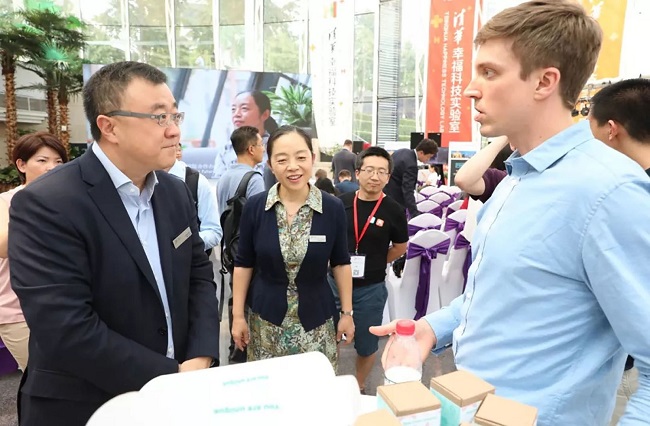
Yang Bin, Vice President of Tsinghua University, Vikram Jandhyala, Vice President of University of Washington, Shi Yuanchun, Dean of GIX at Tsinghua University, and Shwetak Patel, CTO of GIX, attended the event.
Xu Bin, Vice Dean of GIX at Tsinghua University, hosted thecompetition. Over 200 people including competition judges, guests, contestants, and the audience were present at the event.
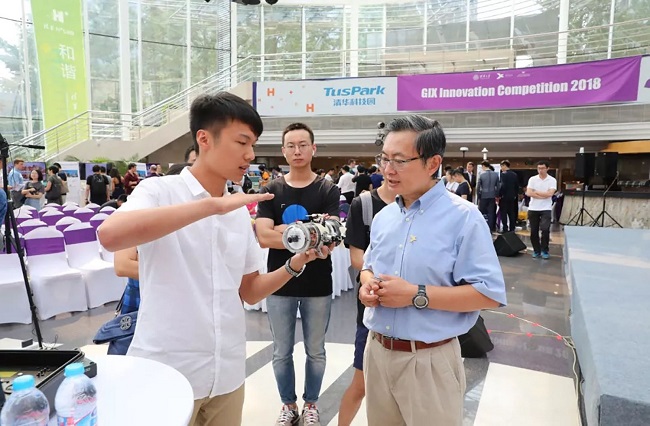
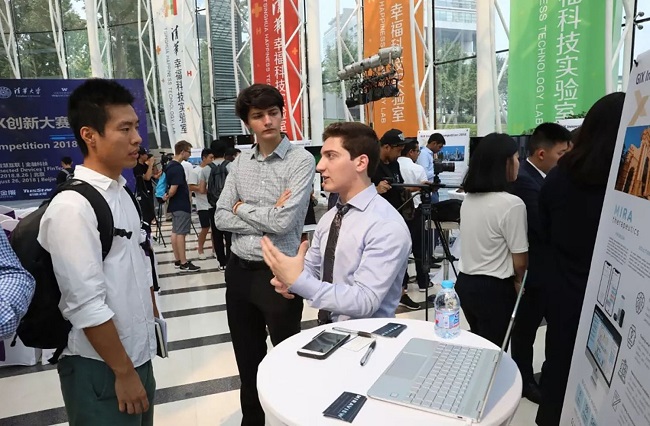
Nine judges for the competition were Vikram, Shwetak, Jia Qingshan, Vice Dean of GIX at Tsinghua Univeristy, Zhang Jinsheng, Vice President of TusHoldings and Chairman of TusStar, Lan Yanxiang, CTO of Youxin Financial, Tim Pan, Senior Director of Microsoft Research Asia Outreach, Chi Yufeng, Chairman and Founder of Perfect World, LiuJiang, Head of Meituan-Dianping Institute of Technology, and Deng Feng, Founder of Northern Light Venture Capital.
GIX Innovation Competition 2018, called for university students and young innovators to bring their “Connected Devices” projects that are original and technologically inventive, covering areas such as the Internet of Things, wearable devices, intelligent hardware, VR, AR, ubiquitous computing, intelligent sensors, natural interactions and related applications in various fields such as education, environment protection, healthcare, transportation, fitness, entertainment, and information accessibility, etc.
This year, a new track of FinTech was also added based on “Connected Devices.” The competition is held annually, and organized by GIX at Tsinghua University. This year’s competition was sponsored by Youxin Financial, TusStar and Meituan-Dianping.
Since it was launched on March 28 at Seattle, 20 teams out of over 400 teams entered the final, whose members were from the US, China, Indonesia, Canada, South Korean and so forth.
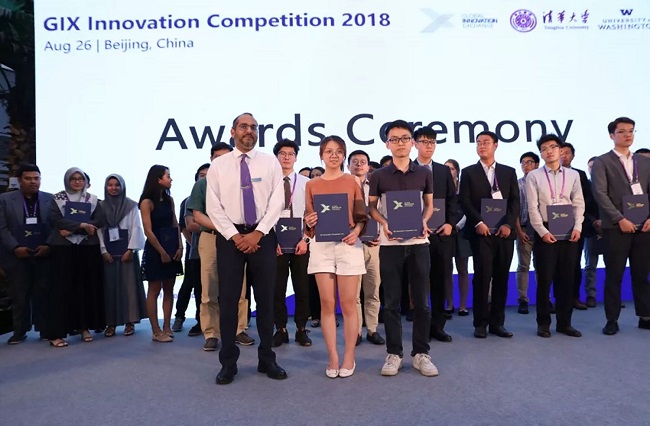
First Prize Winner Air Faucet System, Li Qizhang (right one)
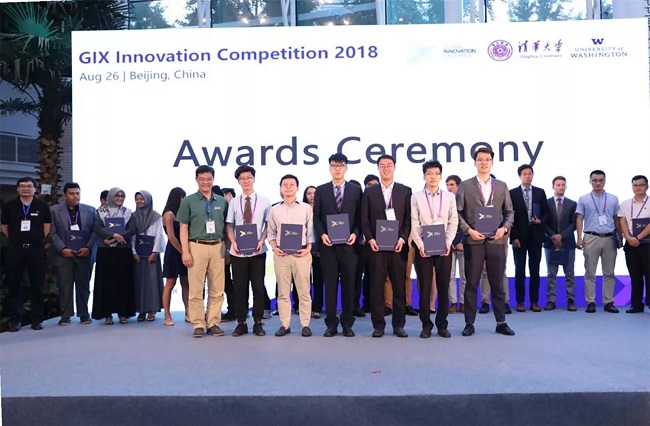
The Second Prize winners
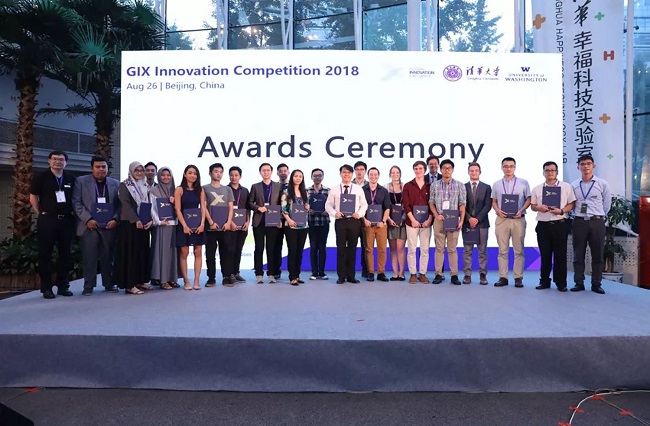
The Third Prize winners
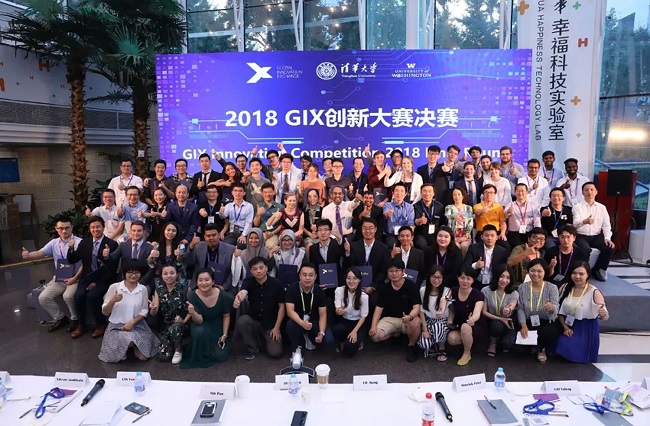
Among 20 projects, many try to provide solutions for current practical issues as well as focusing on future technology and trends.
For example, the first prize winner Air Faucet System subverts traditional way of water utilization by using self-developed low-pressure high-efficiency atomization technology, which can achieve a water-saving rateas high as 90 percent while providing good cleaning effect and comfortable user experience.
Li Qizhang, a student from Tsinghua University as well as the CEO of Air Faucet System, said that this competitionis a very great one and his team has benefited a lot.
“It’s great that we could have an exhibition in front of the public before the competition road shows. We were connected with a lot of people including potential customers, clients and investors. We also gained good advice by face-to-face communication with the judges including Deng Feng,” said Li Qizhang.
“Many contestants and projects impress and inspire me a lot, including Mira Therapeutics and DEXMO. MiraTherapeutics offers digital therapeutics for Post-Traumatic Stress Disorder treatment, which can be seen as a virtual patient assistant. Communicating with other contestants also helps greatly open up my horizon,” he said.
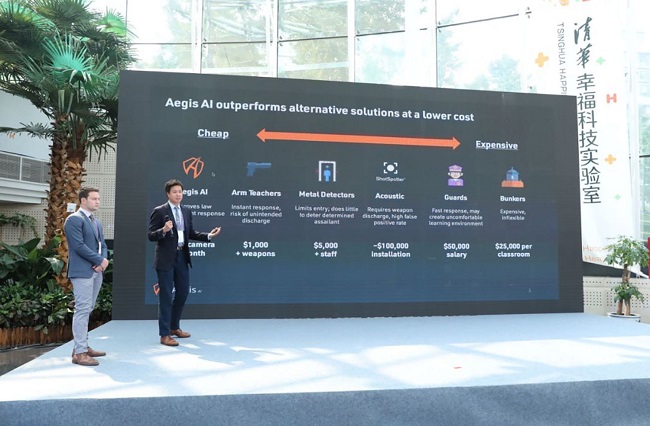
Aegis AI
Third-prize winner, the team from Chicago and Seattle also brought their project Aegis AI, which employs computer vision to automatically detects guns in existing security camera feeds, then notifies the police and provides early warning to building occupants.
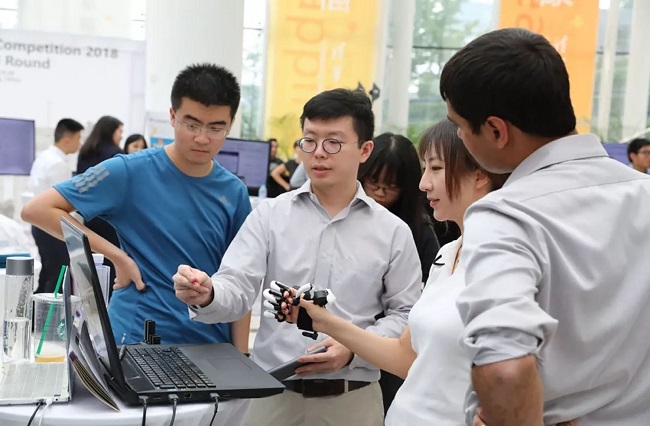
A woman is trying the prototype of DEXMO
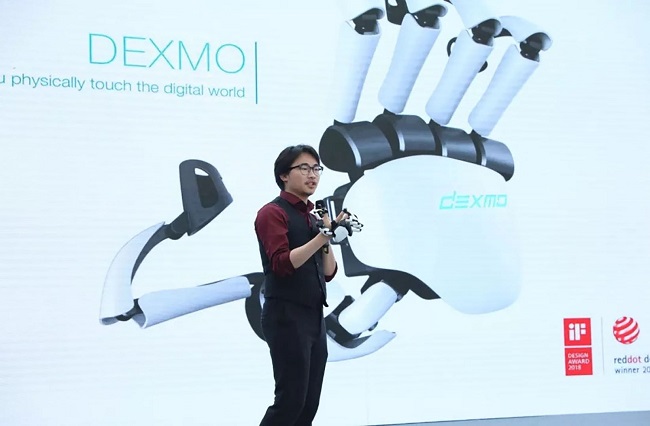
DEXMO
Second-prize winner DEXMO is a light full hand force feedback exoskeleton, which captures all hand motions and provides virtual force feedback. It can be used in various scenarios, including virtual training scenes like operating theaters, nuclear power plants, or space stations, as well as virtual assembly line, medical rehabilitation, or social VR and gaming.
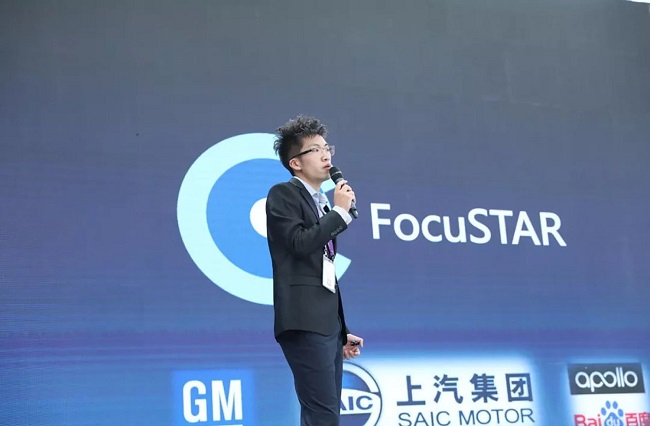
FocuSTAR
Another second-prize winner, a student’s team from University of Electronic Science and Technology of China in Chengdu, Sichuan Province brought their project FocuSTAR. It is a positioning system applied in the field of autonomous driving on social road. With this system, vehicles can dissolve and receive their and others’ location information spontaneously, achieving unlimited system capacity.
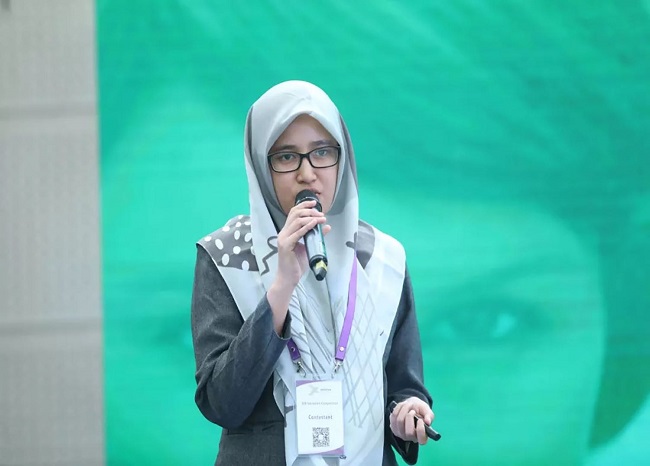
Masyithah NurAulia
One member of Brainstat, Masyithah NurAulia from Indonesia, said that they learned many things. As the third-prize winner, Brainstat is an application which is used to monitor the condition of the driver from their brainwave activity.
“We got nice experiences, new networking, and many good feedbacks for our product which helped us to improve both ourselves and our product. We got many networkings to China’s media and even an invitation to join an event in Shenzhen. Also as one of the winners, we got additional funding to develop our product,” said Masyithah Nur Aulia.
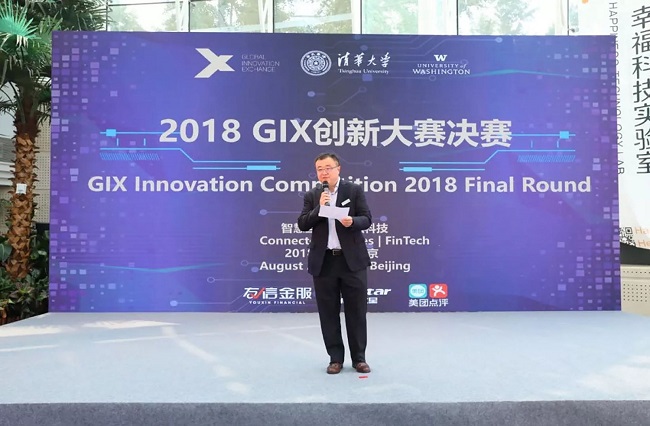
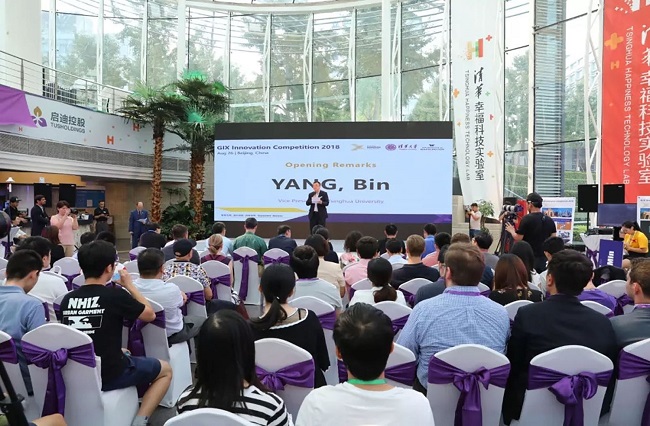
Vice President of Tsinghua University Yang Bin
Before the competition started, Yang Bin, first gave a speech.
“GIX, the Global Innovation Exchange, is a pioneering education-research platform co-founded by two world-leading research universities, Tsinghua University and the University of Washington, with the sponsorship by Microsoft. GIX locates in Seattle, Washington. Like the dawn redwood, planted by President Xi Jinping on September 23, 2015, during his visit to Seattle, GIX has thrived, in the forms of both physical campus and the programs,” said Yang Bin.
“GIX Innovation Competition, which was first launched in 2016, is to foster the passion of technological innovation among young talents worldwide, as well as to attract the smart and ambitious students to join GIX programs,” said Yang.
“This year, we‘ve received not only applications from more than 50 leading universities around the world, but in more diverse fields -- we added FinTech as a special track. We also added on-site semi-finals in four cities, while hosting an online semi-final for the participants who cannot travel to the on-site ones. We also added a feature ‘online advisor panel,’ which gives contestants for the final a direct link to a group of experts, who provides advice on both technical matters and on how to take their ideas to a start-up stage,” he said.
He ended that “Overall, I believe all the contestants, regardless winning or not, have learned, grown and would agree this has been a truly global innovative experience.”
Then 20 teams showed their projects and answered many questions from the judges including their projects’ technology innovations, application value, market, etc.
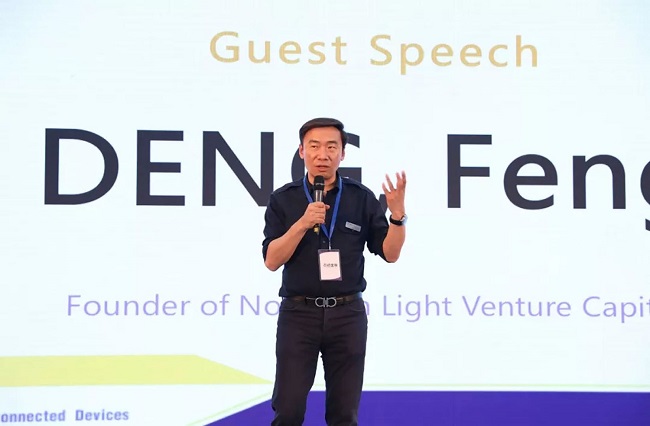
Deng Feng
After the road shows, Deng Feng, as the representative of the judge panel, gave his comments and advice for the contestants.
“Today’s projects covered a lot of areas including biology, healthcare and so on. Here, you can see the innovation is really happening. Actually, for the next five, ten, or twenty years, you can see the innovation is going to happen continuously. Therefore, I am very glad to see that they are moving on the right direction,” said Deng Feng.
Deng also gave his suggestions on the importance of addressing technical issues for perspective markets.
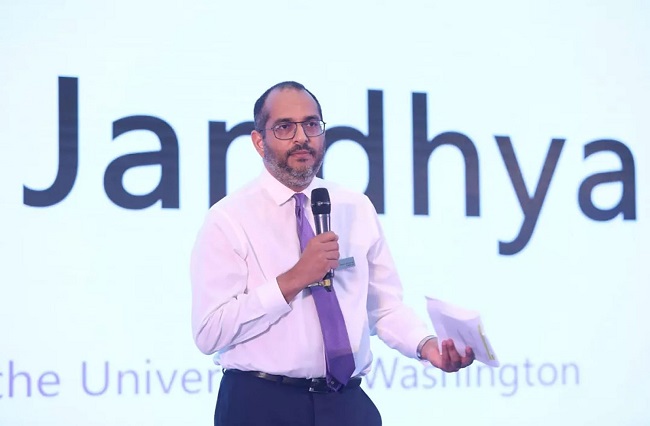
Vikram Jandhyala
Vikram Jandhyala then gave the closing speech.
“In just its third year, this competition attracted entries from more than 400 teams across an amazing breadth of projects, including education, environmental protection, healthcare, transportation, fitness, and entertainment leveraging AI, AR/VR, robotics, facial recognition and computer vision among other emerging technologies. Seeing this range of ideas from very talented students from all over the world makes us excited about the future of the world,” said Vikram.
By stressing the importance of global innovation, he said that “It’s truly heartening to see such a global collaboration at a time when the world needs it very much. And it’s one more confirmation that innovations come from everywhere. Specifically, with regard to innovations from China, I am a longtime fan of WeChat, and no company beats DJI’s drones.”
He continued that he recently met with the CEO of Starbucks, who told him that they are learning from innovations in China, including their new delivery service with Alibaba, and 3-D printing technology that is changing rapid prototyping of store designs. He also heard from the CEO of Boeing recently that Chinese students are creating better ways to manage engine maintenance using AI.
“GIX is developing talent that will address future global challenges in technology disruption, workforce, environment, and health, etc. As Mr. Yang Bin often remarks, GIX is founded on several ‘I’s: International, Industry, Interdisciplinary, Innovation, and Integration. Please stay connected. GIX will become a good model for global collaboration that we need more of,” said Vikram.
Source: Global Innovation eXchange Institute (GIX)
Editor: Guo Lili

